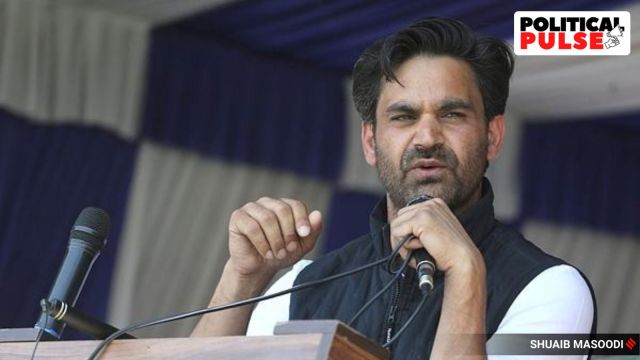PDP’s Waheed Para: ‘BJP is half the J&K government … The opposition within the Assembly is about five of us’
PDP Legislature Party leader says: 'Liquor revenue is not the only thing that runs J&K government. We have so much religious tourism — from Mata Vaishno Devi to Amarnath Yatra… Societal concerns… should drown out fiscal concerns,”
 PDP Legislature Party leader Waheed Para said J&K CM Omar Abdullah must address demands that are within his purview – liquor ban, regularisation of land, and jobs. (Express File Photo by Shuaib Masoodi)
PDP Legislature Party leader Waheed Para said J&K CM Omar Abdullah must address demands that are within his purview – liquor ban, regularisation of land, and jobs. (Express File Photo by Shuaib Masoodi)Amid a growing clamour for a liquor ban in Jammu and Kashmir (J&K), the Opposition Peoples Democratic Party (PDP) has launched a campaign for this demand. With the Budget session of the J&K Assembly set to start on March 3, the PDP has submitted a private member’s Bill seeking a ban on the sale and consumption of alcohol in the Union Territory (UT). The PDP, which has only three MLAs, is gearing up to raise various matters of public concern in the House. The PDP Legislature Party leader, Waheed ur Rehman Para, the 36-year-old Pulwama MLA, is also the party’s youth wing chief. In an interview with The Indian Express, Waheed Para speaks on a range of issues. Excerpts:
The PDP has submitted some private member Bills for the upcoming Assembly session. Why are they important?
Every MLA can place three (private) Bills before the House (in a session). Till now the Transaction of Business Rules compiled for the Assembly have not been discussed with us. We don’t even have its draft. We just got a notification that you can submit the Bills you want to bring. So, what we have focused on are fears that have taken hold on the ground, primarily dispossession that people feel with regard to land and jobs, among others.
Our first private Bill, “Jammu And Kashmir (Regularisation And Recognition of Property Rights of Residents In Public Land) Bill, 2025”, seeks to provide housing. This is in light of families being evicted from state land last year. We had opposed this then but now that there is a government in place, I think we can help by regularising it. Already there are schemes like PMAY, then why would we make anyone homeless by evicting them from the land they have been staying on for 20 years. We need to secure their shelter.
Second is “The Jammu and Kashmir Civil Services (Special Provisions for Regularization of Ad hoc, Daily Wagers, Need Based and other temporary workers) Act 2025”. There are over one lakh daily wage workers in J&K. These are people that in some cases have given 30 years of their lives to the government. Then they are told that they have no security and asked to leave employment. This process is dehumanising because the salaries don’t come in time and this disturbs the whole family. So for this, we have sought a job security Bill which covers all casual and daily wage workers.
Another important Bill, submitted by my colleague Mohammad Fayaz Mir, is the “J&K Prohibition of Alcohol Bill, 2025.”
We are also proposing a Sheikh ul Alam University for Pulwama.
There is a fiscal concern over the imposition of a ban on alcohol in J&K. How do you think the UT might compensate for the revenue brought in by the sale of alcohol in the wake of this ban?
This is a UT with a high prevalence of drugs and the population is already dealing with that. When you bring in societal concerns and tie them with concerns of tourist safety and women safety, these should drown out the fiscal concerns.
Also, I am sure this is not the only thing that runs the J&K government. We have so much religious tourism — from Mata Vaishno Devi to Amarnath Yatra. Lakhs of people travel here for their religious beliefs and this is apart from the Muslim majority character of J&K. Therefore, this is also to send a message that we are not going to provide social acceptance to the consumption of alcohol.
There are also financial implications to regularising daily wagers. How do these things make sense in a revenue-deficit UT?
There are costs but the government could also apply the Minimum Wages Act. How can you have a daily wager working 30 days for Rs 3,000? There are terrible accounts of families struggling. Additionally, a lot of your essential services are running on these workers. Ambulance drivers, watchmen or security guards, workers in irrigation and flood control — people who are not even counted. A private security guard will get Rs 15,000 in a hospital and the government-employed person gets Rs 5,000. There is a big disparity here and it needs to be addressed.
Most of the opposition to the National Conference-led government is coming from the PDP, more than the principal Opposition BJP, at least in the Valley. Why?
The BJP is half the government. The Lt Governor is the head of government and he is the Centre’s nominee. So the BJP will not say anything against the head of UT. They also have no issues when it comes to exercising power. The Central services are under the L-G, so any BJP representatives can approach the L-G for work they need implemented. All officers know who is in charge and they also listen to them. The opposition within the Assembly is about five of us.
The NC government has stated that it has to work with the Centre for securing the interests of the J&K people. You’re claiming the BJP will not counter them, so where does this leave the PDP?
We are raising issues of the people. Where the Centre is concerned, we raise our voice against the Central government and where there are issues of governance, we hold Chief Minister Omar Abdullah accountable. There are demands that are within Omar Abdullah’s competence as the CM and we are asking for those to be addressed — liquor ban, regularisation, etc. These issues need debate and discussion.
I understand that, say, Article 370 is outside the prerogative of the 90 elected MLAs and that the restoration of statehood is also perhaps outside its purview now. But what is within their (NC government’s) competence, they should address them urgently. They can take up these issues one by one and give sanctity to the Assembly too.



- 01
- 02
- 03
- 04
- 05



























